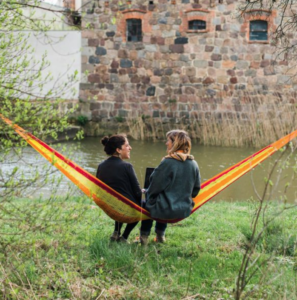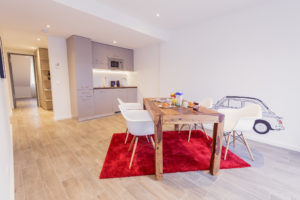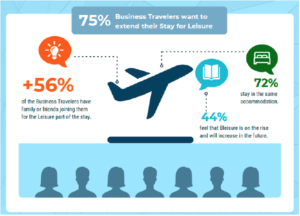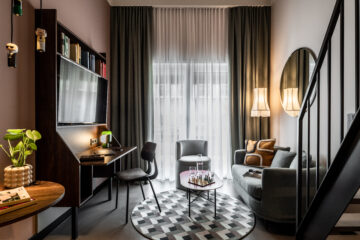“The changes in working and living environments have also affected business travel. Bleisure is more than just a desire for more leisure.” Sylvie Konzack
 Sitting in the middle of the Brandenburg province in the Hollywood swing, working and then going mushrooming? What sounds unspectacular has been made presentable for the business travel world by Coconat, the new tourism award winner. Because the “Workation Retreat” brings the metropolitan trend of co-working and co-living to the countryside, far away from classic conference hotels on the Glien estate, one hour from Berlin. The offer ranges from communal meals and campfires, gardening and yoga to spending the night in a hotel room, floating tent or sleeping box. On average, guests stay at Coconat for almost five days, some for six months, and about half of them come from abroad. And: they all meet the fire brigade or the village association, who can use the rooms free of charge.
Sitting in the middle of the Brandenburg province in the Hollywood swing, working and then going mushrooming? What sounds unspectacular has been made presentable for the business travel world by Coconat, the new tourism award winner. Because the “Workation Retreat” brings the metropolitan trend of co-working and co-living to the countryside, far away from classic conference hotels on the Glien estate, one hour from Berlin. The offer ranges from communal meals and campfires, gardening and yoga to spending the night in a hotel room, floating tent or sleeping box. On average, guests stay at Coconat for almost five days, some for six months, and about half of them come from abroad. And: they all meet the fire brigade or the village association, who can use the rooms free of charge.
Change of location and perspective Lanzarote: Sven Korhummel, managing director of the agency – Cyperfection, has currently opened a “pop-up office” for his employees on the Canary Island for six months. With this, everyone should be able to try out new things in their job away from everyday office life and develop further. Until March 2020 up to six employees will live and work in changing teams in a holiday villa with a large garden, pool and terrace. Leisure facilities included.
More relaxed with the customer
The world of work is on the move. The why, where and how is currently being renegotiated in many places, and work is being rebalanced in favour of more freedom and flexibility in line with the changed living environments. Business trips are changing from being a round-trip affair to opportunities to add private time off hours and days to the business trip. A growing number of companies are already open- minded about this topic. The HR department of the Merck Group in Darmstadt, for example, sums it up as follows: “If the success of the business trip is the main focus and the company does not incur higher costs, why not? And if you travel by plane, you also save emissions, “because the employee does not have to travel separately. Longer stays are also associated with lower air fares. Florian Storp, Vice President Central Europe at American Express Global Business Travel and Chairman of the DRV Business Travel Committee, also sees many advantages: “If you don’t have to rush to the airport immediately after your appointment, you’ll be more relaxed when meeting customers. At the same time, knowledge of the country and place increases customer understanding.

The increasing openness of companies and associations is matched by an enormous need for employees. Almost three quarters (72 percent) of business travelers have already taken a Bleisure trip, according to the study “Chefsache Business Travel 2019”, an initiative of travel management companies in the German Travel Association (DRV). Those who travel for business more than three times a month make particularly frequent use of Bleisure options (80 percent). This is particularly true of managing directors and board members: Eight out of ten combine business trips with a short break, while for salaried specialists and managers it is around two-thirds. And who would have guessed otherwise: Young professionals are the most interested in bleisure by age comparison. According to a study by SAP Concur 2018, 44 percent of 18- to 29-year-olds in Germany are interested in it, and 25 percent of over- 40s.
New opportunities for travel providers
According to “Chefsache Business Travel 2019”, the scope of Bleisure has so far been varied – whether it be by leaving a few hours later (approx. 30 percent), spending private time with your partner or friends in the same hotel (21 percent) and adding one or more overnight stays (approx. 50 percent). Around 72 percent do not change hotels for this, according to a survey by the Great Hotels of the World. The approx. 50 independent luxury hotels of the association therefore focus not only on being suitable for business but also for leisure. The private hotels offer “a sense of place and history” together with
concierges familiar with the area, or are located close to tourist attractions, but they also have “communal work and relaxation rooms”, informs CEO Pedro Colaco.

The Meliá Hotels, in turn, which see themselves as leisure hotels, explicitly offer their business travellers in city hotels bleisure services with a “variety of experiences and our Mediterranean-inspired service culture”, says Gabriel Escarrer, Executive Vice President and CEO.
 And for the trend segment of serviced apartments, in which professionals often stay in the city for several weeks on a project basis or as “newcomers”, Bleisure is also a part of the concept that is lived out in many places. “Staying is as much a part of the DNA of Serviced Apartments as the home decor. Because no one has to check in and out over the weekend, as in a hotel, and you can accommodate family or friends,” stresses Anett Gregorius, founder and owner of Apartment Service. Among the providers she arranges are the Adina Apartment Hotels. “Our hotels are the perfect bleisure accommodation, as they not only offer a workplace in each apartment, but with a pool, 24-hour reception, their own kitchen and restaurant, they give you the freedom to personalize each day,” says Adina’s managing director Georgios Ganitis. The Brera Serviced Apartments also rely on the neighbourhood: “Our long-term guests have a great need to experience their temporary homes and surroundings,” says Christiane Anstötz, responsible for Sales, Marketing & Operation. “We are therefore in the phase of finding a good, personal solution for this, in order to share exciting and less known tips with the guests”.
And for the trend segment of serviced apartments, in which professionals often stay in the city for several weeks on a project basis or as “newcomers”, Bleisure is also a part of the concept that is lived out in many places. “Staying is as much a part of the DNA of Serviced Apartments as the home decor. Because no one has to check in and out over the weekend, as in a hotel, and you can accommodate family or friends,” stresses Anett Gregorius, founder and owner of Apartment Service. Among the providers she arranges are the Adina Apartment Hotels. “Our hotels are the perfect bleisure accommodation, as they not only offer a workplace in each apartment, but with a pool, 24-hour reception, their own kitchen and restaurant, they give you the freedom to personalize each day,” says Adina’s managing director Georgios Ganitis. The Brera Serviced Apartments also rely on the neighbourhood: “Our long-term guests have a great need to experience their temporary homes and surroundings,” says Christiane Anstötz, responsible for Sales, Marketing & Operation. “We are therefore in the phase of finding a good, personal solution for this, in order to share exciting and less known tips with the guests”.
Transparency is everything
The key question for many remains who bears what costs and insurance. In principle, there is a willingness to pay any additional costs incurred for the private extension of the trip yourself. According to the DRV study, 55 percent of employees are willing to pay for the additional hotel nights alone or with a partner. At the same time, only one in three would pay a higher airfare for a later return flight. It is crucial that employees inform their employers – and that companies define extension options, cost and insurance models in their travel guidelines without misunderstanding. However, employee expectations are likely to rise in the future. More than one-third already see the employer as responsible for travel insurance and security, according to a 2018 survey of European business travelers conducted by the Global Business Travel Association (GBTA) in partnership with SAP Concur. According to the survey, 36 percent feel that additional airfare costs should be borne by the company as a result of the extension, while 28 percent also believe that additional accommodation costs should be covered. Younger business travelers in particular would like to be accommodated. So, new challenges for many companies? Perhaps, but some of them will also be decided by the creativity of the possibilities. Workation retreats or pop-up offices already show what is possible. 80 % of the managing directors combine business trips with a short holiday. (DRV study “Chefsache Business Travel 2019”) 55 % the employee pays for the additional hotel accommodation alone or with a partner. (DRV study “Chefsache Business Travel 2019”) 75 % of business travellers want to extend their stay for Leisure. (Survey GHOTW 2019)
Sylvie Konzack …

can easily imagine writing a few bleisure articles on the co-working hanging swing in the middle of nowhere and then enjoying the trip to anywhere. Bleisure is sustainable and creative, for the individual as well as for the company.
.
Fotos: © iStock.com/g-stockstudio, Brera Serviced Apartments, Apartmentservice, Coconat Retreat




